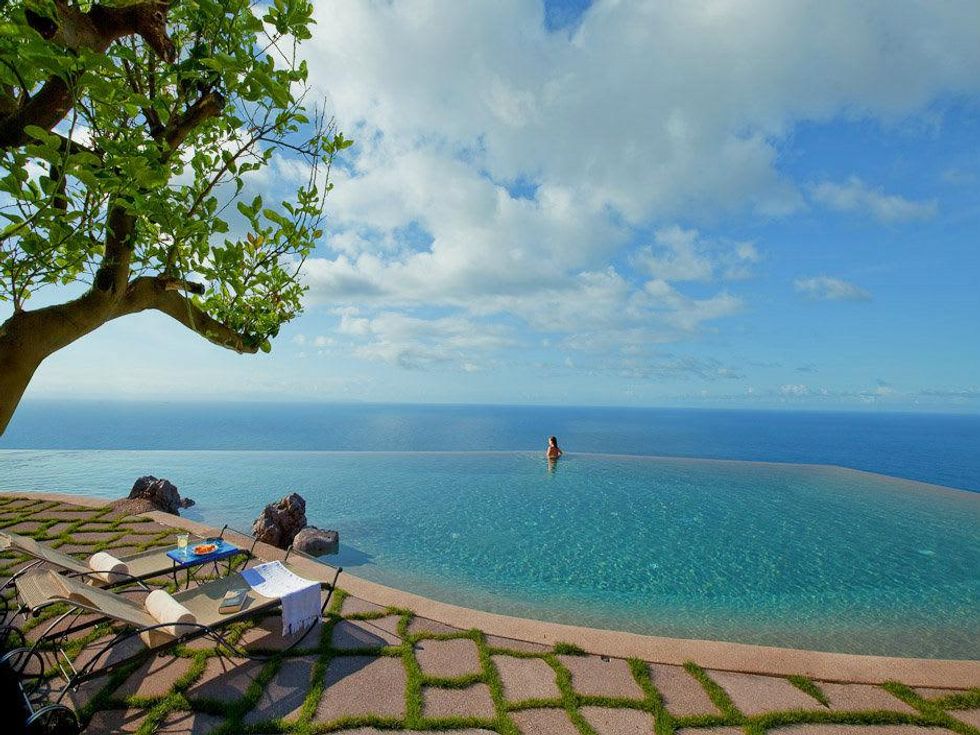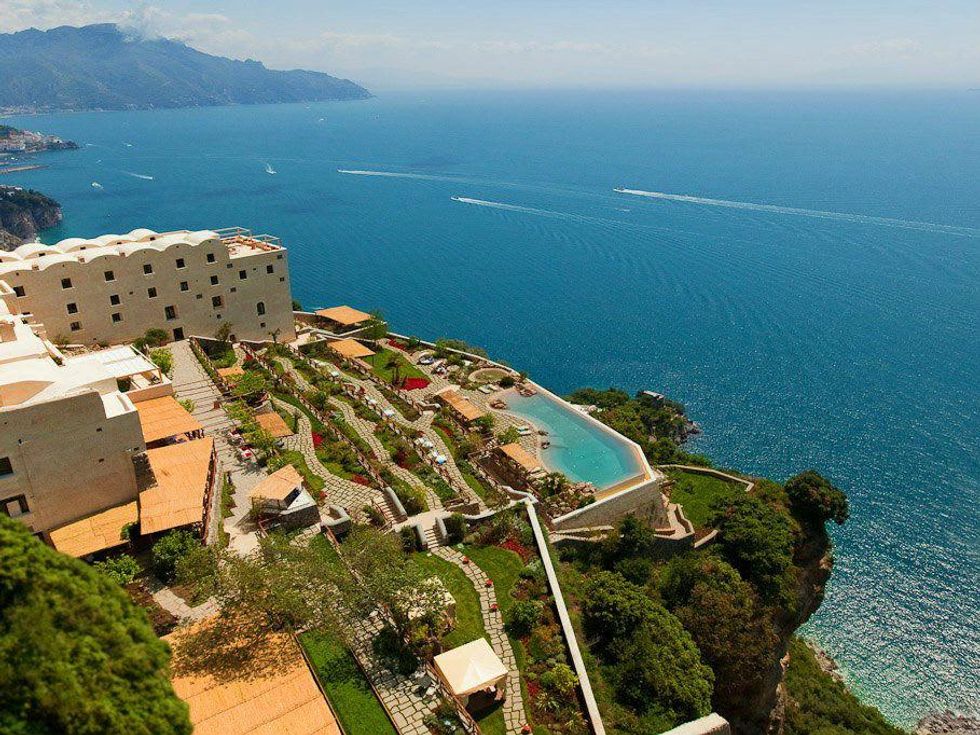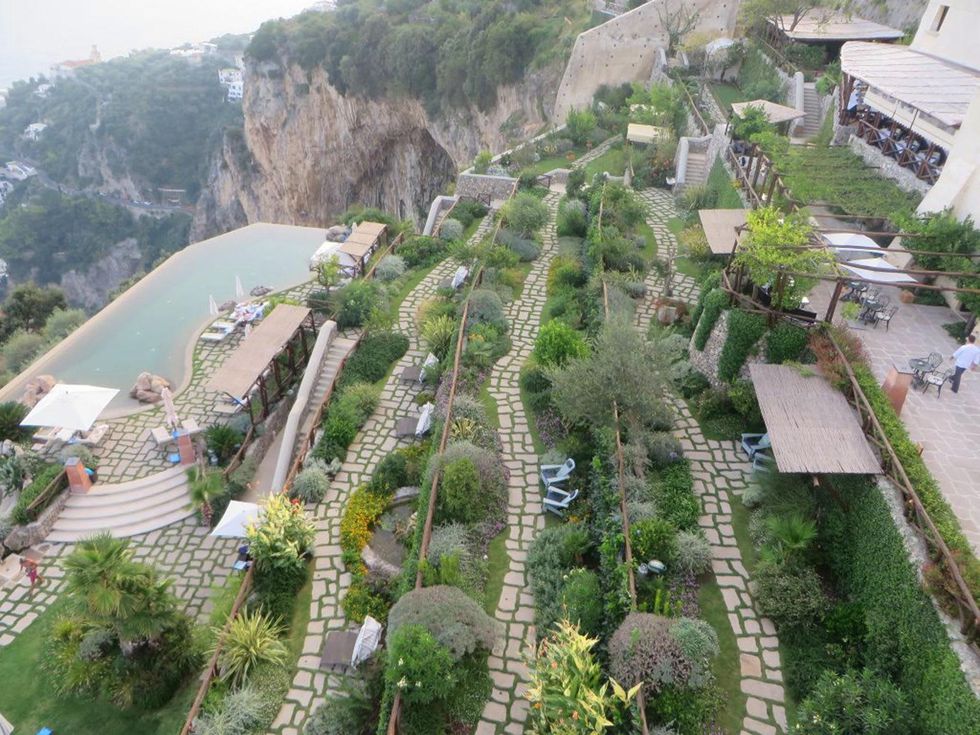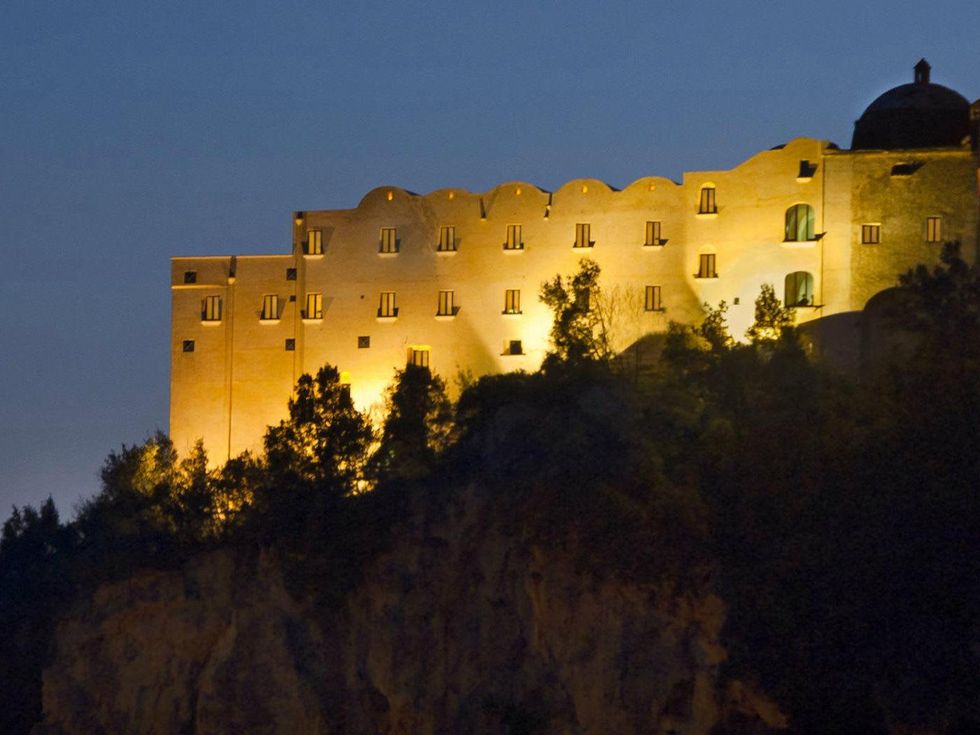Serenity in Italy
Amalfi Coast hotel owned by former Texan boasts best infinity pool in Europe
After the frenetic, somewhat jarring energy of Rome, we were seeking some serenity and simplicity in our vacation. Our next destination was Italy’s Amalfi Coast, 170 miles to the southwest of Rome and one of Europe’s coolest spots, where both Italians and tourists flock during the summer months.
The strip between Palm Beach and Miami would be the closest comparison that we have here in the United States — but think sea and high cliffs, not sea and flat land.
One of the many joys of traveling in Europe is making extensive use of its modern, well-designed, affordable and convenient trains, which move efficiently and seamlessly from city to city, town to town and country to country. We boarded our train in Rome at 11 am. Traveling 150 miles an hour, we arrived two hours later in Salerno, the town closest to our hotel.
In 1999, Bianca Sharma saw this majestic, though dilapidated, building sitting alone atop a high rock cliff and immediately decided to buy and restore it.
I was not prepared for the verticalness of the Amalfi Coast. As we drove up the steep, narrow, winding road, with 180 degree switchbacks, bikers (no bike lanes), walkers (no sidewalks), trucks, buses and steep drop-offs, I was relieved that we had decided to use a hotel driver rather than rent a car. These roads are not for those with claustrophobia or fear of heights or who need more than two inches of clearance between vehicles.
My business partner, John Lamar, the ultimate road warrior, had recommended the Monastero Santa Rosa Hotel & Spa to us, and what a recommendation it proved to be. The hotel — built in 1621 atop a high vertical rock as a monastery for nuns — was opened just three years ago by former Texan Bianca Sharma. (Her late husband was founder of Dallas-based i2 Technologies.)
In 1924, a Roman businessman had acquired the monastery and turned it into a hotel, but it had long since fallen into disrepair. In 1999, Sharma, cruising along the Amalfi Coast, saw this majestic, though dilapidated, building sitting alone atop a high rock cliff and immediately decided to buy and restore it.
Her project, a true labor of love and work of art (with seemingly unlimited funds), took more than 10 years to complete and opened with great fanfare; Prince Albert and Princess Charlene were the first guests.
The building’s structure is very much in keeping with its original purpose. There is no check-in desk. Guests enter a vestibule through a door less than 6 feet high with a screen at the back, where families could visit the nuns 400 years ago. They couldn’t see them and could only communicate through the screen. It’s still there.
A small nearby balcony has a view that will take your breath away. The blue sea stretches to the horizon. The hotel’s landscape architect is the landscape architect for the Vatican. The arched hallways, some with their original confessional booths, have a sacred feel. The property reflects its sense of place. It still has an active church and holds regular Saturday night mass for locals.
Monastero Santa Rosa’s cliff-edge infinity pool juts out over the shimmering Tyrrhenian Sea. The staff offers cold towels and lemon sorbet.
Each of the 20 ocean-view rooms and suites is identified by the name of a local flower. Each room is unique and ranges in size from tiny to two-level, and high-season rates range between €390 and €2,500 a day ($495-$3,170).
Our room, Primula, one of the smallest, was beautifully designed and furnished with a nod to its historical roots but also with modern touches, including a marble bathroom with heated floor, rainfall shower and soaking tub. The balcony looks down at beautifully manicured terraces and pool and out across the Mediterranean.
And, oh yes, rooms have a sophisticated music system that allowed us to stream our iPad through concert-grade speakers or select from hundreds of playlists on the in-house sound system. The password for the music and Internet access: “simplicity.”
Monastero Santa Rosa’s cliff-edge infinity pool, jutting out over the shimmering Tyrrhenian Sea, is one of the most stunning pools I’ve ever seen. Not typically a pool person, I spent the day basking in the sun, being attended to by the gracious staff who offered us cold towels and lemon sorbet.
The four levels of cascading, fragrant gardens above the pool, which were designed by one of the Vatican’s landscape team, afford pockets of privacy that reinforces the feeling of spaciousness and peacefulness.
The hotel has a cutting-edge chef working on his first Michelin star restaurant, and he can pick all of his vegetables in the organic garden onsite. My husband feasted on sea urchin ravioli, but the staff was also happy to accommodate my request for a simple linguine with olive oil, garlic and freshly picked herbs.
You can’t visit a hotel that promotes serenity without a visit to the spa, especially one nominated for numerous awards. Here the spa treatment rooms are housed in a cavernous, two-story part of the building that served as secluded prayer rooms in its prior life as a monastery. I was the only person there, and it felt like receiving a massage in a church.
At night, we somewhat reluctantly left the serenity of the hotel and ventured five miles into the town of Amalfi to explore. It is hard to find a bad meal in Italy, and we were delighted to discover many family-run cafes with three generations cooking and working together. And like all Italian cities, big or small, one can always find people gathering at dusk around the town square or church, laughing, talking and people watching.
Although we were eager to get out of Rome, it was very hard to leave Monastero Santa Rosa. “There was so much more to do,” I said to my husband, thinking that all I really wanted to do was soak up one more day of serenity in this idyllic and stylish retreat.




